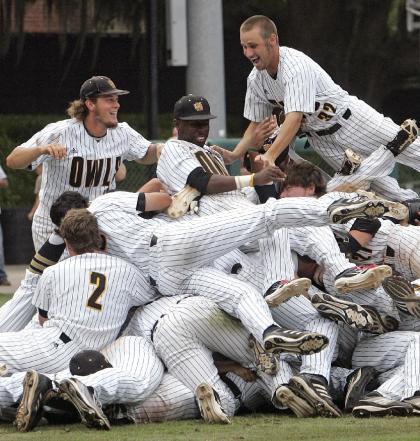Why giant-slaying upsets in NCAA's baseball and basketball tourneys could be in danger

Atlantic Sun commissioner Ted Gumbart was in a rental car Monday, headed south from Macon, Ga., to the league's spring meetings in Daytona Beach Shores, Fla.
Driving time is roughly 5½ hours. Commissioners of power leagues may well have fired up the private jet for that commute, but the A-Sun isn't in that category.
Still, Gumbart could feel like a college sports kingpin for a day – actually another in a series of overachieving days for his low-major conference. He had just watched on his phone as Kennesaw State eliminated Southeastern Conference blueblood Alabama from the NCAA baseball tourney and advanced to the Super Regional round, which is the Sweet 16 of college baseball.
"A very enjoyable moment for us," Gumbart told Yahoo Sports on his way to the Florida coast.
This sport is not as hopelessly weighted against the little guys as college football (Louisiana-Lafayette of the Sun Belt Conference is actually the No. 1 team in America, according to some polls). But if you don't think it's a shocking upset in the grand scheme of things, consider these 2013 athletic revenue numbers for the two schools, from Department of Education filings:

Kennesaw State: $12.3 million.
Alabama: $143 million.
That is the beauty of an all-inclusive tournament: The paupers get their shot at the princes on a level field of play. Every once in a while the paupers win – and quite often lately the ones winning are from the A-Sun.
Kennesaw State follows Mercer into the giant-slayer roles, after the Bears took down Duke in the NCAA basketball tournament. And Mercer followed Florida Gulf Coast, which became the first No. 15 seed ever to make the hoops Sweet 16 in 2013 by upsetting Georgetown and San Diego State.
Gumbart pointed out that three A-Sun teams made the NCAA softball tournament this spring, and all three won games. The league also put four teams in the NCAA golf tournament. Kennesaw State baseball, which can advance to the College World Series with two wins at Louisville this week, is merely the team of the moment in the A-Sun.
"Kennesaw just put another big chunk on the side of the scale saying, 'Yes, it can happen,' " Gumbart said.
The fact that it can happen is one of the most beautiful parts of college athletics. National tournaments that give the little guy a chance against the big guy on the field of play are part of the reason why these competitions are a compelling and popular alternative to pro sports for many. The populist appeal is real.
But the context for the Owls' triumph certainly is interesting. These are changing times in college sports, as power schools like Alabama seek to distance themselves even further from the likes of Kennesaw State.
Schools from the "Power Five" leagues have argued for years that they have little in common with the un-powerful majority. Now they are closing in on a historic NCAA membership vote that would grant them autonomy to basically create their own rules, which are more applicable to schools swimming in media-rights cash.
Just three days before Kennesaw State beat a blueblood from his league, Southeastern Conference commissioner Mike Slive flexed some rhetorical muscle about the need for Power Five schools to gain autonomy on their terms. If autonomy comes with a super-majority voting margin needed to pass legislation, that won't sit too well with some folks – including those in the SEC.

So Slive fired a shot across the NCAA membership bow Friday at the SEC spring meetings, saying the next option if a favorable autonomy structure doesn't pass is to create a "Division IV." That set off a ripple of reaction, because the Power Five would be moving another step away from the rest of Division I.
While Slive's statements could be posturing intended to influence the vote in the Power Five's favor, one industry insider suggested the threat is real. In fact, he said it could become more real if the situation deteriorates.
"If they don't get autonomy, the next option is Division IV," the insider told Yahoo Sports. "And after that is the nuclear option."
In other words: a full split from the NCAA.
"I've talked to a few presidents who would be fine with the nuclear option," the insider said.
That, of course, would kill Cinderella once and for all. If the Power Five leagues left the NCAA, then the basketball tournament would never be the same. And so would the college baseball tournament. And the Frozen Four, which saw tiny Union College of New York win the national title this year.
On the road in his rental car, Ted Gumbart didn't see it coming to that. He generally supports the ability for the Power Five schools to make their own rules, knowing it will allow them to do things financially for athletes that A-Sun members will never match.
"They deserve to have that opportunity," he said. "We would have a big concern if they changed the number of scholarships a school can award. If they go from 13 in basketball to 18, that would be a game changer. But I don't think we're headed in that direction right now.
"If they decide to split from the NCAA entirely, I don't think that would be desirable."
If they do that, Kennesaw State would never get its chance to beat Alabama in baseball. And college sports would be a far lesser place.

